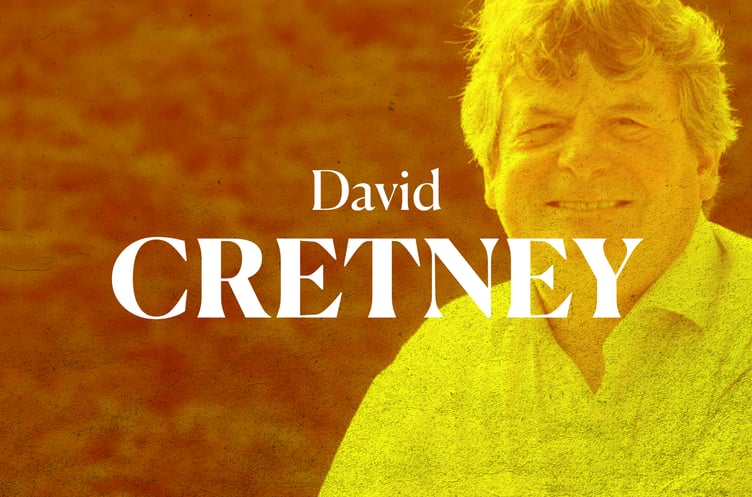This column first appeared in the Isle of Man Examiner of November 1.
For a couple of years now together with my grandchildren, Stan and Ivy, we have adopted a little stretch of the River Glass just before it joins the River Dhoo.
The stretch is adjacent to the Ellan Vannin Gymnastics centre, just across from the National Sports Centre.
At times when the river is low in the summer we attend with our ladders to gain access, armed with litter pickers and black bags and complete with wellies!
We have found all sorts of things from the typical packaging to footballs, traffic cones, parts of car bodies and more.
Next to the river is land that occupied by McDonald’s, which has at least three bins in place for the food packaging to be placed in but it’s clear that some people don’t use them.
In fact, a favourite spot nearby to consume a takeaway is the car park for the former Quarterbridge Hotel and again there are bins but all too often they must overflow or, worse, some people just throw the packaging out of their car windows.
I don’t know if they still do but McDonald’s very responsibly employed someone to try to avoid litter problems in the area nearby.
The boss of the restaurant, when seeing Ivy and Stan doing their bit, kindly gave them a treat.
But it’s the mindset that feels ‘I don’t as a member of society have an obligation to tidy up after me’ that causes concern.
It was certainly drummed in to me when I was young. As part of our environmental obligations and thinking about others, it just seems such a basic thing to do. So why sometimes isn’t it?
It was good news to read recently that Bill Dale and his team at Beach Buddies, which has received global recognition, has come up with a new initiative.
River Buddies was created in response to numerous requests across the Isle of Man over recent years for Beach Buddies to get involved in clean-up operations away from beaches, based on the success of what the charity has achieved since formation in 2006.
The source of the vast majority of rubbish on the world’s beaches starts inland, and virtually all rubbish (90%) is coming via rivers, so to clean up rivers in the words of Bill Dale is something of a ‘no-brainer’.
There are restrictions, however, due to migratory fish spawning between September and May, so River Buddies won’t actually physically get into rivers until next summer. Probably about the same time as Ivy and Stan!
In the meantime, the aim is to clean up around river banks and they are encouraging reports of rubbish in all rivers in order for them to draw up a hit list for 2023.
Look out for their first river bank clean-up event which will be posted on the Beach Buddies Facebook page in early November.
They have been very encouraged by the number of anglers who have sent supportive messages and asked to get involved.
Indeed, my experience is just the same regarding the vigilance of anglers who are often best placed to spot areas that require attention.
A good friend, the late Geoff Walmsley, would often alert me to such situations. Shopping trolleys, bikes, traffic cones and more a long distance from where they should be.
Beach Buddies already runs community clean-up events on a regular basis with various schools and villages and are very keen to join in with any community group and will bring along the equipment, and remove the rubbish afterwards, recycling all items they can, such as plastics, metals and glass.
Again I witnessed such support first hand last year when together with a neighbour, Chris Wilde, who was new to the island but who recognised the importance of an area adjacent to Scoill Vallajeelt and St Thomas’s called Manor Woods.
There, together with the support of nearby residents, we started to manage the area sustainably for the future. An ongoing community project with the support of the schools, residents, environmental organisations and others.
When talking to Bill it got me thinking about journalists and others involved with the media and communication over the years.
Going back a long time I recall the dispute with Henri Leopold D’or, then owner of the Examiner when based in Hill Street.
Described in a 1998 debate in Tynwald by the late Geoff Cannell as ‘definitely the Maxwell of the Isle of Man’, including, far before Mr Maxwell brought it in, pension schemes which later, to the workers who had spent the majority of their life there, proved to be absolutely worthless.
[Robert Maxwell, who owned the Daily Mirror and its sister papers in the eighties and early nineties, stole money from their pension fund.]
The debate at the time was in relation to monopolies.
Following the dispute Bill and others from small premises in Railway Shops, Peel Road, established the Isle of Man Gazette.
Geoff Cannell, himself a former journalist, went on to say in the debate: ‘In the days of Eric Kinrade as the editor and other stalwarts, I was asked to write the leaders on a weekly basis for the Weekly Times, which I did for two years and I was told by the owner, the publisher that the Examiner was for Mec Vannin, The Times was for government and the Manx Star was for anything radical.’
Politicians traditionally seem to have a love/hate relationship with the press but I always thought the most important thing was to try to communicate your position clearly.
Also if you get something wrong, hold your hands up.
The media are doing their job so it’s best to be open and not evasive. You won’t be happy about everything that is written or broadcast, but that’s the nature of the game!
Anyway, back to Bill and the Gazette, I guess it must have been about 40 years ago but under nom de plume he invited me to write a column in the paper each week. My favourite subject at school was English, something I still enjoy today if perhaps my jottings are a little less radical than then!
I think it’s important that the media challenge the status quo.
It’s the same in Tynwald, there used to be a financial incentive for members to take up government positions which led in some instances to departments being top heavy in this respect. Now scrutiny is rightly seen as equally important and rewarded as such.
There is a history in the media of challenge on our island, perhaps one of the most important being James Brown.
A journalist and founder of the Isle of Man Times, he moved to the island in 1846 at the time of the so called ‘printing boom’.
The lack of taxes on newspapers on the island and other Crown Dependencies, along with a loophole that allowed them to be posted free of charge to subscribers in the UK, formed a flourishing printing industry on the island.
Space does not permit me to expand fully but I will certainly return to his contribution.
Suffice to say that, among other things, he campaigned for a democratically-elected House of Keys in 1864.
He published defiant articles, calling for freedom of the press and democracy including during his six weeks served of a six months sentence in Castle Rushen.
Within two years the House of Keys became an elected body.


.jpeg?width=209&height=140&crop=209:145,smart&quality=75)

.jpeg?width=209&height=140&crop=209:145,smart&quality=75)